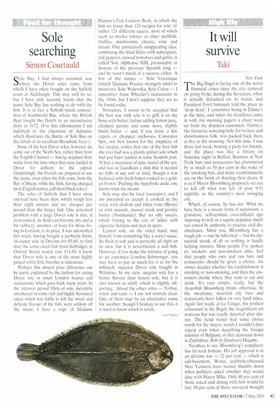Sole searching
Simon Courtauld
Sale Bay. I had always assumed, was where the Dover soles came from which I have often bought on the Suffolk coast at Aldeburgh. This may well be so, but I have only recently learnt that the name Sole Bay has nothing to do with the fish. It is in fact a Suffolk-speak contraction of Southwold Bay, where the British fleet fought the Dutch to an inconclusive draw in 1672. (For this information I am indebted to the chairman of Adnams, which illustrates the Battle of Sole Bay on the labels of its excellent Broadside beer.)
Some of the best Dover soles, however, do come out of the North Sea, rather than from the English Channel — having acquired their name from the time when they were landed at Dover for delivery to the capital. (Surprisingly, the French are prepared to use the name, even when the fish come from the Bay of Biscay, while the Irish, having changed most English names, call them black soles.)
The soles of Suffolk that I have most enjoyed have been slips, which weigh less than eight ounces and are cheaper per pound than the larger fish. One potential problem with a large Dover sole is that, if overcooked, its flesh can become dry and a bit rubbery; another, at least for those living in London, is its price. I was astonished last week, having bought a perfectly fresh, 16-ounce sole in Devizes for £5.60, to find that the same-sized fish from Selfridges in Oxford Street would cost 1.14.50. I know that Dover sole is one of the most highly prized white fish, but this is ridiculous.
Perhaps this absurd price difference can be partly explained by the fashion for eating Dover sole in smart London houses and restaurants, which goes back many years. In the interwar period fillets of sole, inevitably smothered in some rich and highly flavoured sauce which was liable to kill the sweet and delicate flavour of the fish, were seldom off the menu. I have a copy of Madame Prunier's Fish Cookery Book, in which she lists no fewer than 124 recipes for sole, or rather 124 different sauces, most of which seem to involve lobster or other shellfish, truffles, mushrooms, cheese, wine and cream. One particularly unappealing idea, combining the fried fillets with aubergines, red peppers, stewed tomatoes and garlic, is called Sole Alphonse XIII, presumably in honour of the previous Spanish king — and he wasn't much of a success either. A few of the names — Sole Veronique (which Madame Prunier strangely omits to mention). Sole Walewska, Sole Cubat — I remember from Wheeler's restaurants in the 1960s. but I don't suppose they are to be found today.
Nowadays, it seems to be accepted that the best way with sole is to grill it on the bone with butter, before adding lemon juice, chopped parsley and some more, slightly burnt butter — and, if you insist, a few capers or chopped anchovies. Constance Spry, not best known for the simplicity of her recipes, writes that one of the best fish she ever had was a plainly grilled sole which had just been landed at some Scottish port. `It had a sweetness of nuts, tasted of the sea, and was so Lucullean a dish that it needed no frills of any sort or kind, though it was bedewed with fresh butter cooked to a golden brown.' Pushing the hyperbole aside, one knows what she meant.
Sole may also be fried (metrniere), and I am prepared to accept it cooked in the oven, with shallots and white wine (Berg) or with mussels, mussel stock and parsley butter (Norrnande). But no silly sauces, which belong to the era of ladies with cigarette holders and men in spats.
Lemon sole, on the other hand, may benefit from something like a sorrel sauce. Its flesh is soft and is perfectly all right on its own. but it is nevertheless a dull fish. However, if you make the mistake of going to an expensive London fishmonger, you may have to pay as much for it as for the infinitely superior Dover sole bought in Wiltshire. In my view, megrim sole has a better flavour than lemon sole, but it is also known as whiff, which is slightly offputting. About the other soles — Torbay, witch and sand — I am not entirely clear. One of them may be an alternative name for another; though I hesitate to say this, it is hard to know which is witch.
Lucy. vicker}


































































































 Previous page
Previous page